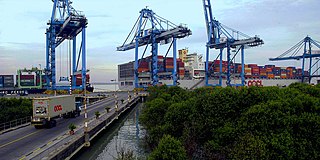
Port Klang is a town and the main gateway by sea into Malaysia. Known during colonial times as Port Swettenham but renamed Port Klang in July 1972, it is the largest port in the country. It is located about 6 kilometres (3.7 mi) southwest of the town of Klang, and 38 kilometres (24 mi) southwest of Kuala Lumpur.

Sime Darby Berhad is a Malaysian trading conglomerate. Its core businesses operate and serve in the industrial, motors and logistics sectors as well as the healthcare, and insurance segments.
Prasarana Malaysia Berhad (Prasarana) (English: Malaysian Infrastructure Limited) is a 100% government-owned company which was set up by Ministry of Finance (Malaysia) as a corporate body established under the Minister of Finance (Incorporation) Act 1957 to own the assets of multi-modal public transport operator in Malaysia, under the government's move to restructure the city's public transport system. It is one of the largest public-transport companies in Malaysia other than Konsortium Transnasional Berhad. As a government-owned company since 1998, it operates stage bus and light metro services via several wholly owned subsidiaries.
Irene Xavier is a Malaysian women's rights activist. She is a prominent member of Friends of Women, Selangor - Persatuan Sahabat Wanita, Selangor (PSWS), a women's rights NGO. She is also a key activist of Suaram, Malaysia's leading human rights organisation.

This article lists important figures and events in Malaysian public affairs during the year 1998, together with births and deaths of notable Malaysians. Malaysia hosted the XVI Commonwealth Games in Kuala Lumpur between 11 and 21 September.

Tourism in Malaysia is a major industry and contributor to the Malaysian economy.
The Coalition for Clean and Fair Election or Bersih is a coalition of non-governmental organisations (NGOs) which seeks to reform the current electoral system in Malaysia to improve its democracy by ensuring free, clean and fair elections among other reforms.
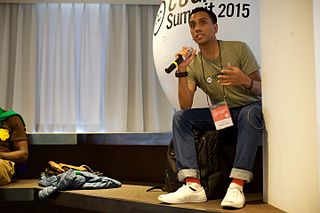
Abdul Muid bin Abdul Latif was a Malaysian-based web designer, graphic designer and digital artist, who is known for promoting the cultural elements of the Southeast Asia from Batik and Songket into his commercial works and artworks.

Citibank Berhad is a licensed commercial bank operating in Malaysia with its headquarters in Jalan Ampang, Kuala Lumpur. Citibank Berhad operates as a subsidiary of Citigroup Holding (Singapore) Private Limited, commencing its banking operations in Malaysia since 1959. Citibank Berhad was locally incorporated in 1994. Citibank Berhad has 11 branches spread across Kuala Lumpur, Selangor, Penang, Kuantan, Malacca and Johor, offering a wide range of banking and financial services including retail banking, institutional banking, and investment products and services.
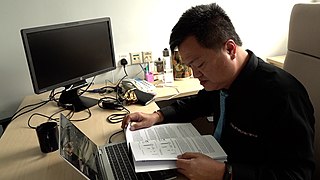
Wong Chin Huat is a Malaysian political scientist, scholar, analyst, activist, commentator, columnist, observer and lecturer.

Abdul Samad bin Mohamed Said is a Malaysian novelist and poet. In May 1976, he was named by Malaysia literature communities and many of the country's linguists as the Pejuang Sastera [Literary Exponent] receiving, within the following decade, the 1979 Southeast Asia Write Award and, in 1986, in appreciation of his continuous writings and contributions to the nation's literary heritage, or Kesusasteraan Melayu, the title Sasterawan Negara or National Leaurate.

The Asian Forum for Human Rights and Development (FORUM-ASIA) [previously known as Forum-Asia] is a membership-based regional human rights organisation with 85 member organisations in 23 countries across Asia. It is committed to the promotion and protection of all human rights including the right to development.
Water supply and sanitation in Malaysia is characterised by numerous achievements, as well as some challenges. Universal access to water supply at affordable tariffs is a substantial achievement. The government has also shown a commitment to make the sector more efficient, to create a sustainable funding mechanism and to improve the customer orientation of service providers through sector reforms enacted in 2006. The reform creates a modern institutional structure for the water sector, including an autonomous regulatory agency, an asset management company and commercialised state water companies that have to reach certain key performance indicators that will be monitored by the regulatory agency. The government has also stated its intention not to embark on new private sector contracts for water provision, after a bout of such contracts during the 1990s showed mixed results.
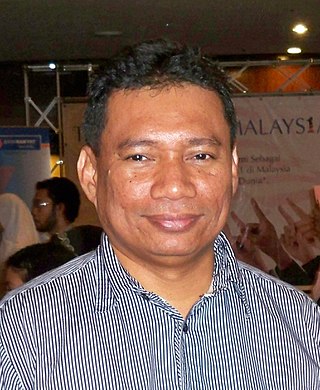
Syed Mohd Zakir Bin Syed Othman Al-Yahya, is a Malaysian writer of prose, poetry, and theatrical texts.
Tan Sri Dato' Sri (Dr.) Mohamad Norza Zakaria is a Malaysian chartered accountant and a fellow of CPA Australia. He is currently the President of Olympic Council of Malaysia (OCM) and also holds the post of President of Commonwealth Games Association of Malaysia.
Tun Azizan bin Zainul Abidin was a Malaysian corporate figure and civil servant who was the former Chairman, President and Chief Executive Officer (CEO) of Petronas. He was the father of Amir Hamzah Azizan, the Minister of Finance II, Senator and former CEO of the Employees Provident Fund (EPF).
Dato’ Seri Nik Mohamed bin Nik Mahmood is a Director of Kumpulan Senireka Sdn Bhd., a large commercial architecture firm in Kuala Lumpur, Malaysia. Mahmood founded the firm in 1973 after he left the Public Works Department. The firm specializes in commercial highrise buildings, and they have done some significant religious buildings. In the 1970s they were operating in the Brutalist idiom, but they turned to Postmodernism at the end of the century and were responsible for some prominent postmodern buildings in Malaysia, including the Menara Axis, 2002, Istana Negara Baru and the Kompleks Dewan Bahasa & Pustaka.
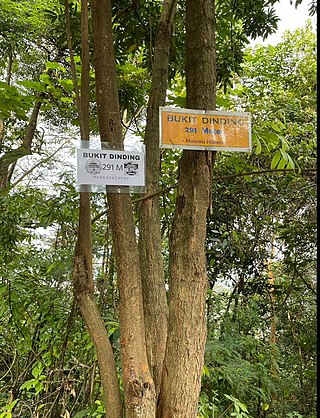
Bukit Dinding is a forested hill with published height of 291m in Kuala Lumpur sitting in between Setiawangsa and Wangsa Maju. There are variation of heights in different records where according to Google Earth (2022), the height of Bukit Dinding is 302m, but acccording to Kuala Lumpur Slope Information System (KULSIS), it is 311m.
Amir Hariri bin Abdul Hadi is a Malaysian politician who is a co-founder and member of the Malaysian United Democratic Alliance (MUDA). He was the founding, 1st and 3rd Secretary-General of MUDA from September 2020 to his resignation in August 2021 and again since July 2022.











